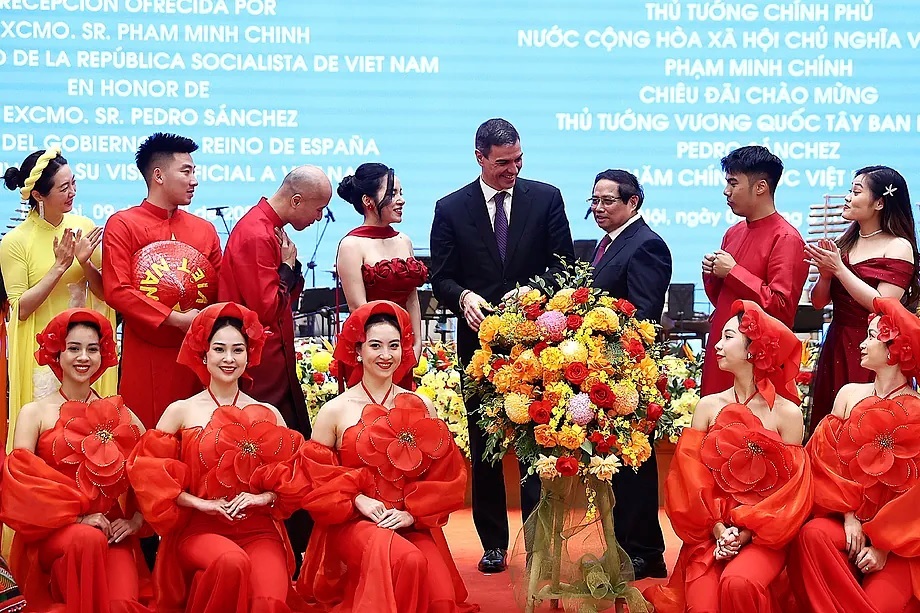On Friday, he will land in Beijing. And the timing is crucial. When Pedro Sánchez meets with Xi Jinping, his Chinese counterpart, he will be facing the main adversary of Donald Trump. The commercial battle seems to be increasingly focused on a Washington-Beijing war. Spain finds itself in the middle, as it was already pointed out by the U.S. Administration on Wednesday for its involvement in favor of a shift from Europe towards Asia. Indeed, Moncloa has been engaged in this adventure for years, with increasing interaction with China. In fact, Sánchez positions himself as the EU's intermediary in this endeavor. After three years of flirting with Xi, Sánchez has now become a target for Trump.
In a thinly veiled manner, Treasury Secretary Scott Bessent issued a warning to Europe with a specific emphasis on Spain. At a forum, when asked by the moderator, the high-ranking Trump official remarked: "I can tell the rest of the world that the comment this morning, I'm not sure if it was from the Prime Minister or the Minister of Economy of Spain, about perhaps aligning more with China, would be cutting one's own throat." Bessent implied that the Asian giant is insatiable and that allowing them into your market will eventually backfire. "They never stop, they keep producing, and dumping, and dumping. If their products don't come here, they will have to go somewhere else."
Bessent's criticism coincides with Sánchez's mini Asian tour, with stops in Vietnam and just 24 hours before heading to Beijing. The government's initial reaction was largely a reaffirmation: "We have excellent trade relations with China that we obviously intend not only to continue but to expand." Luis Planas, the Minister of Agriculture accompanying the president on his trip, added: "Expanding trade relations with other countries, and with such an important partner as China, is not at the expense of anyone, but everyone must draw their own conclusions. We have a firm position in defense of the interests of Spanish companies and citizens, fully aligned with the EU."
Open strategic autonomy. These are the three words that Sánchez has been emphasizing for at least two years, since Spain held the EU Council presidency. Even before, since the pandemic. The aim is to strive for self-sufficiency in vital sectors and not depend on a single partner. In this roadmap, China stands out in La Moncloa's global strategy. It has become a priority in commercial relations. La Moncloa argues that it is not a bet against anyone, but the geopolitical context has given a new dimension to Sánchez's pioneering role, as even the Chinese ambassador acknowledged in an interview with this newspaper last Monday, praising his courage, for example, regarding tariffs on Chinese automobiles.
Regardless of the roles that other actors, such as former President José Luis Rodríguez Zapatero, may play, Sánchez has managed to become a privileged interlocutor with Xi Jinping. They have met three times in Beijing in just two years. This week, the spokesperson for the Chinese Ministry of Foreign Affairs, Lin Jian, stated that the bilateral relationship with Spain is "at the forefront" of their ties with European countries. Sánchez himself, in an informal conversation with accompanying journalists during this mini-tour, defended that there are elements to work on the relationship with Asia and is convinced that Spain can play a role in building more balanced alliances between the EU and China.
Although the visits by the Prime Minister are bilateral and involve matters affecting Spanish companies and products, they are coordinated and worked on by the EU. For instance, Sánchez will once again convey to Xi the need to rebalance the trade deficit -China represents 93% of Spain's trade deficit-, but any changes would have a European impact. In fact, the leader of the PSOE is not alone in his aspirations anymore. A few weeks ago, Trade Commissioner Maros Sefcovic met with Chinese Vice Premier He Lifeng in China and echoed Sánchez's message: "We need to tangibly rebalance our trade and investment relationships."
The Spanish government sees Trump's decision as even "interesting" in the sense that it will accentuate the need to look beyond and find other important partners, including Mercosur, Chile, Mexico, India... The U.S. offensive is criticized in Moncloa -"the unilateral imposition of tariffs outside any rules provided for in the WTO is not a good instrument"-, but they do not intend to wait idly. Government sources add that when one decides to impose massive tariffs on the whole world, "one cannot expect people to sit in a chair and applaud."
The Spanish government's position on this matter, despite any veiled threats or warnings that may come from the Trump administration, can be summarized as Sánchez advocating for a relationship with China based on openness: "We want more trade and investments." And in the midst of the Trump-Xi war, the United States has taken a keen interest in Spain.
